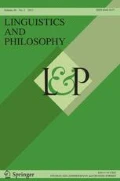REFERENCES
Aragonès, E. and Neeman, Z.: 2000, ‘Strategic Ambiguity in Electoral Competition’, Journal of Theoretical Politics 12, 183–204.
Aumann, R.: 1987, ‘Correlated Equilibria as an Expression of Bayesian Rationality’, Econometrica 55, 1–18.
Benthem, J. van: 2000, ‘Ariel Rubinstein: “Economics and Language”’, in A. Rubinstein, Five Essays on: Economics and Language, Cambridge University Press.
Crawford, V. P. and Sobel, J.: 1982, ‘Strategic Information Transmission’, Econometrica 50, 1431–1451.
De Jaegher, K. and Jegers, M.: 2001, ‘The Physician-Patient Relationship as a Game of Strategic Information Transmission’, Health Economics 10, 651–668.
Farrell, J.: 1993, ‘Meaning and Credibility in Cheap-Talk Games’, Games and Economic Behavior 5, 514–231.
Fine, K.: 1975, ‘Vagueness, Truth and Logic’, Synthese 30, 265–300.
Grice, H. P.: 1975, ‘Logic and Conversation’, in P. Cole and J. Morgan (eds.), Syntax and Semantics, Vol.3, Academic Press.
Lewis, D.: 1969, Convention – A Philosophical Study, Harvard University Press.
Lewis, D.: 1975 ‘Languages and Language’, in K. Gunderson (ed.), Language, Mind and Knowledge, University of Minnesota Press.
Lipman, B. L.: 2001, ‘Why Is Language Vague’, working paper, University of Wisconsin.
Monderer, D. and Samet, D.: 1989, ‘Approximating Common Knowledge with Common Beliefs’, Games and Economic Behavior 1, 170–190.
Morris, S. and Shin, H. S.: 1996, ‘Approximate Common Knowledge and Co-ordination: Recent Lessons from Game Theory’, Journal of Logic, Language and Information 6, 171–190.
Myerson, R. B: 1991, Game Theory – Analysis of Conflict, Harvard University Press.
Parikh, R.: 1994, ‘Vagueness and Utility: the Semantics of Common Nouns’, Linguistics and Philosophy 17, 521–535.
Parikh, P.: 2000, ‘Communication, Meaning and Interpretation’, Linguistics and Philosophy 23, 185–212.
Rubinstein, A.: 2000, Five Essays on: Economics and Language, Cambridge University Press.
Schelling, T. C.: 1960, The Strategy of Conflict, Harvard University Press.
Vanderschraaf, P.: 1995, ‘Convention as Correlated Equilibrium’, Erkenntnis – An International Journal of Analytical Philosophy 42, 65–88.
Wärneryd, K.: 1993, ‘Cheap Talk, Coordination and Economic Stability’, Games and Economic Behavior 5, 532–546.
Williamson, T.: 1994, Vagueness, Routledge.
Zadeh, L.: 1975, ‘Fuzzy Logic and Approximate Reasoning’, Synthese 30, 407–428.
Author information
Authors and Affiliations
Rights and permissions
About this article
Cite this article
De Jaegher, K. A Game-Theoretic Rationale for Vagueness. Linguistics and Philosophy 26, 637–659 (2003). https://doi.org/10.1023/A:1025853728992
Issue Date:
DOI: https://doi.org/10.1023/A:1025853728992

